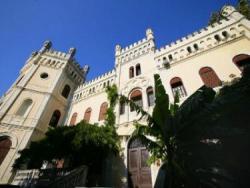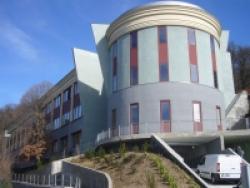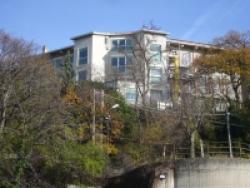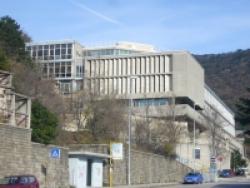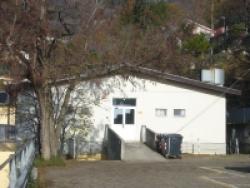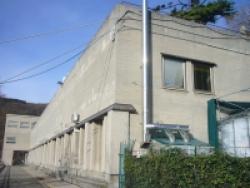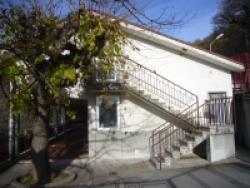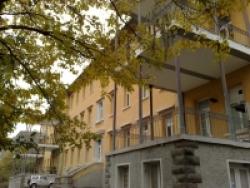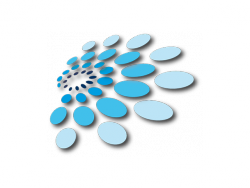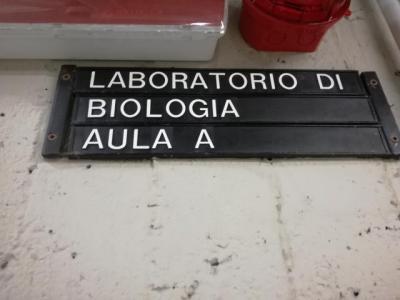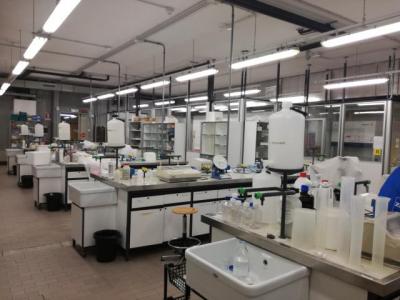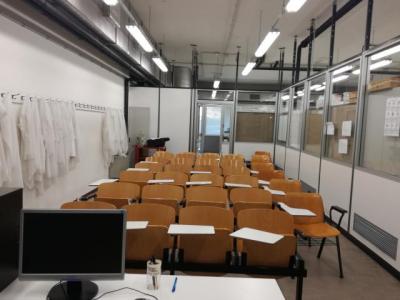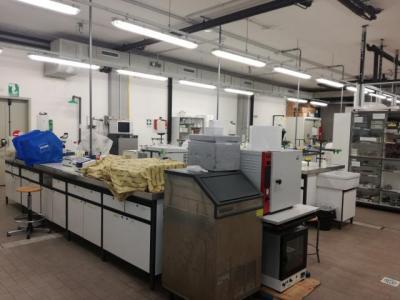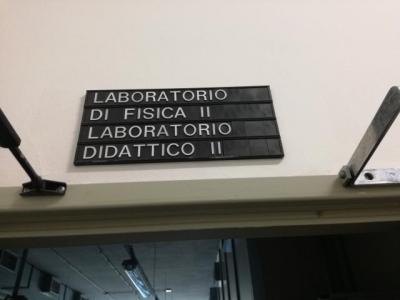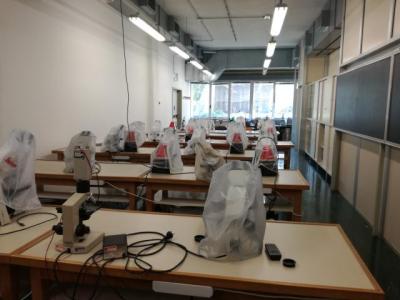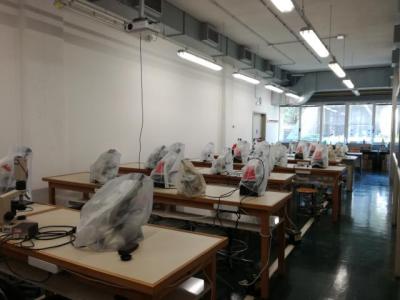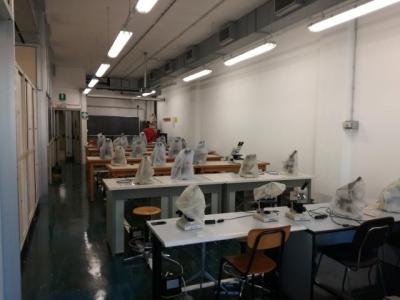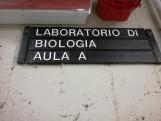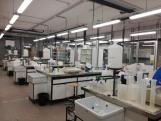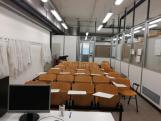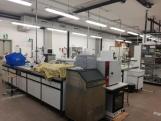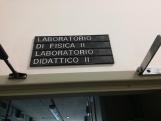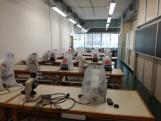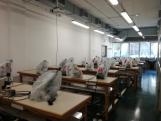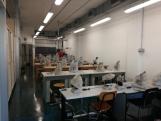- Home
- Department
- Research
- Teaching
- Post Graduate Studies
- Services and Equipment
- Knowledge Transfer
Teaching laboratories
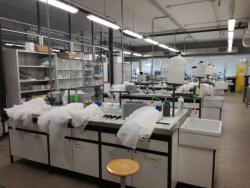
C1 Building («Tutankhamen»)
Via Valerio n. 6/3, I-34127 Trieste (TS)
Biology teaching laboratory
Capacity: 25 seats
The Teaching Lab serves the Courses of Biology, Functional Genomics, Biotechnology and Neuroscience and hosts practical courses of chemistry, biochemistry, cell biology, molecular biology and genetics, microbiology and neurobiology. The lab offers a complete lab infrastructure and is fully equipped to allow individual lab experiences:
This includes workbenches, benchtop and preparative centrifuges, chemical hood and biological laminar flow hoods, incubators for eukaryotic cell culture and microbiology, optical inverted microscopes (also equipped with integrated CCD and monitor), UV/visible spectrophotometers, fluorimeters, luminometers, ELISA plate reader, FPLC, electroporator, thermocyclers, autoclave, small bench instrumentation for manipulation and analysis of nucleic acids and proteins.
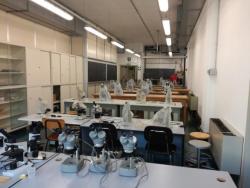
C1 Building («Tutankhamen»)
Via Valerio n. 6/3, I-34127 Trieste (TS)
Microscopy Teaching Laboratory
(ex Phisics II)
Capacity: 25 seats
The optical microscopy laboratory of the Department of Life Sciences has 28 locations dedicated to light field microscopy for histology, cytology and natural sciences. In the laboratory, there is also a modern epifluorescence microscope. The equipment available to students is completed by five digital cameras for image acquisition and advanced sharing systems (WIFI with APP for smartphone).
Building M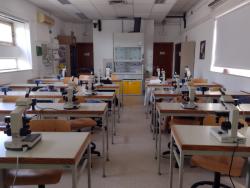
Via Giorgieri 10, I-34127 Trieste (TS)
Room A
Capacity : 30 seats
Room A is used with 28 ZEISS stereo microscopes for exercises of the three-year degree in Sciences and Technologies for the Environment and Nature (STAN) and for the master's degrees in Ecology and Sustainability of Global Changes (ESCG) and Sciences for Marine and Coastal Environment (SAMAC). It is also equipped with a stereo microscope of the teacher's station connected to the PC and consequently to the projector, so that the preparation is displayed on the screen and can be described in all its parts by the teacher. The classroom is currently used by the following teachers: Lucia Muggia, Silvia Battistella, Monia Renzi, Elisabetta Pizzul.
As part of the Systematic Botany Course with laboratory of the three-year degree in Sciences and Technologies for the Environment and Nature, exercises are carried out for the identification of plants (Prof. Lucia Muggia).
As part of the Systematic Zoology course with laboratory of the three-year degree in Sciences and Technologies for the Environment and Nature, exercises are carried out for the identification of Invertebrates starting from Protozoa up to Arthropods and for the observation of the various stages of embryonic development starting from segmentation to arrive at organogenesis in echinoderms and chordates. (prof. Silvia Battistella).
As part of the Ecotoxicology course of the Master's Degrees in Sciences for the Marine and Coastal Environment and in Ecology and Sustainability of Global Changes, ecotoxicological tests are performed on model organisms belonging to freshwater (Daphnia magna) and marine (Brachionus plicatilis) aquatic ecosystems. (Prof. Monia Renzi).
As part of the Conservation and Management of Internal Waters Course of the Master's Degree in Ecology and Sustainability of Global Changes, exercises are carried out for the systematic identification of the different taxa constituting the benthic macroinvertebrate communities and the application of Biotic Indices aimed at determining of the ecological state of freshwater environments. (prof. Elisabetta Pizzul).
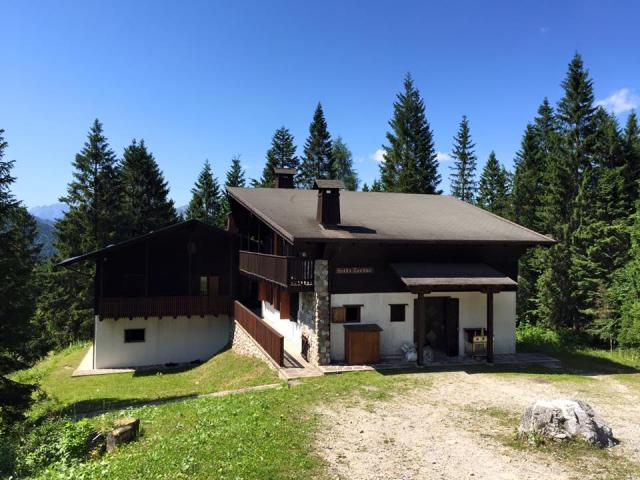
"Baita Torino", Pura Pass, Ampezzo (UD)
Laboratory of the Alpine Center for Botanical Studies
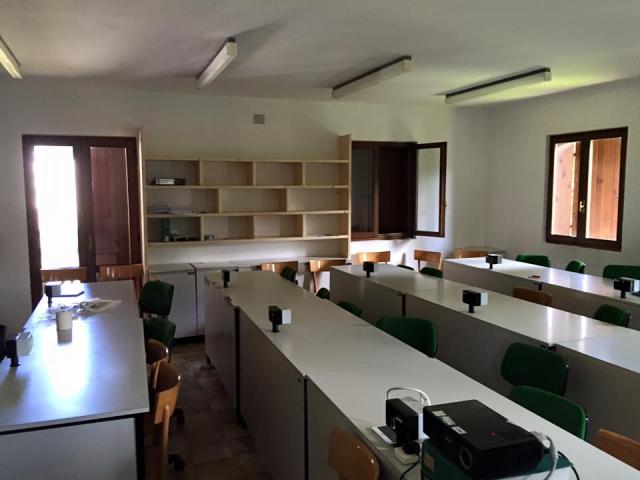 Capacity: 25 seats
Capacity: 25 seats
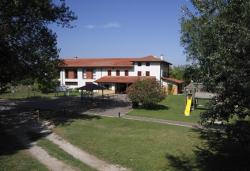
Riserva Naturale Regionale della Foce dell'Isonzo
Comune di San Canzian d'Isonzo, Friuli Venezia Giulia
Guesthouse
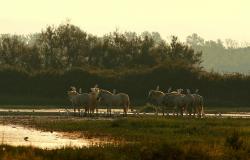
The Summer school of inland water and wildlife management (Prof. Alessio Mortelliti and Prof. Elisabetta Pizzul) is held here. During this field-based course it is possible to learn about wildlife monitoring techniques, identification of species in nature, application of indices aimed at evaluating the ecological status of the environment.
Last update: 08-26-2025 - 17:32
Servizi online
ESSE3 - UGOV - ArTS - Moodle
EasyRoom -Webmail - Cargo mail
Sito Docente (Cineca)
Help intranet:
registrazione.dsv@units.it
---


